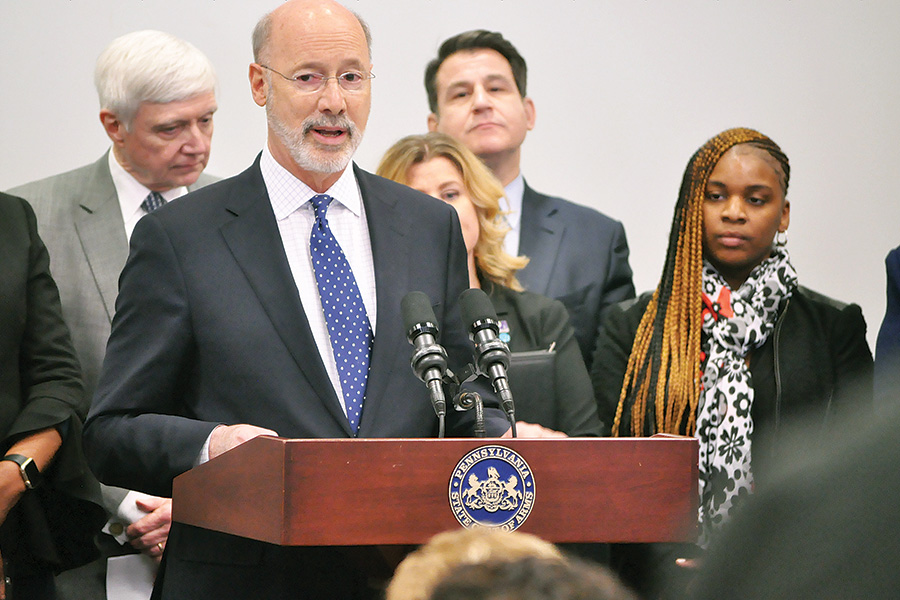Pennsylvania Gov. Tom Wolf and a host of legislators and activists made a stirring call for antidiscrimination legislation that would give LGBT people the same rights as heterosexuals in employment, housing and public accommodations.
“No one, absolutely no one, should ever be a victim of workplace discrimination or sexual harassment,” Wolf said at a press conference April 5 at Temple University’s Liacouras Center. “We cannot and will not accept this behavior as normal.”
The governor called for a wide range of actions against sexual harassment, which may attract varying levels of opposition. Still, the proposal appears to have little chance of passing any time soon.
State Rep. Dan Frankel, an Allegheny County Democrat and the House sponsor of the bill, which is called the Pennsylvania Fairness Act, said his bill and the corresponding legislation in the Senate sponsored by Philadelphia Democrat Larry Farnese are “buried” in their respective state government committees.
In the last session, there was a move to at least get employment and housing protection for LGBT people. The move failed and the bill got nowhere.
“That would have codified discrimination,” Frankel told PGN. “That would have given LGBT people 75 percent of their civil rights. I found that offensive.”
Attempts to water down the legislation appear less likely in this session.
At the press conference, Farnese said he would oppose any attempt to strip the bill of its public-accommodation provisions.
“When the time comes, I’m sure Gov. Wolf will join me in demanding that any antidiscrimination bill will include employment, housing and public accommodation protections so that the LGBT community will be treated fairly and equally like each and every other citizen in the commonwealth.”
The opposition to LGBT equality is familiar.
“Everyone is in agreement that we don’t want to discriminate against LGBT people, but we don’t want to step on the rights of people with religious objections,” said Fred Sembach, chief of staff for Republican Senate State Government Committee Chairman Mike Folmer in an interview with PGN. The legislature shouldn’t be seen as “favoring one or the other but creating a level playing field.”
One of the main opponents of the Pennsylvania Fairness Act is the Pennsylvania Family Institute, a defender of what its mission statement calls “family values.” The Institute did not have anyone immediately available to speak with Philadelphia Gay News.
Business organizations also may take a hard look at the proposed Fairness Act and other nondiscrimination measures announced by the governor in Philadelphia last week. According to a memorandum filed by the Senate sponsors of the Fairness Act, more than 400 companies in Pennsylvania already have nondiscrimination policies covering LGBT employees, but the Pennsylvania chapter of the National Federation of Independent Business will look at the bills to see if they might encourage lawsuits that could threaten the survival of small businesses.
“We have businesses of every ilk — gay and straight,” Suzanne Collins Stoltenberg, communications director for the state chapter of the NFIB, told PGN. But, she said, “if a small business is sued and not even culpable, it still might have to settle or shut down because it can’t afford to defend itself.”
The other side of that equation is that 83 percent of sexual-harassment claims filed with the state Human Relations Commission involve the workplace, said state Sen. Christine Tartaglione, a Philadelphia Democrat who also appeared with the governor.
The antiharassment actions that the governor and legislators called for would eliminate mandatory nondisclosure agreements that keep victims from talking about their experiences. They also would extend protections to very small workplaces. Currently, only people who work for employers with at least four workers are covered. The new proposal by the governor is to cover all workplaces.The proposals also include extending the statute of limitations from 180 days, the current limitation, to two years and guarantee the right to a jury trial and to seek punitive damages.
The scope of the antiharassment measures also would include lobbyists at the state capitol, who would be required to undergo anti-harassment training.
